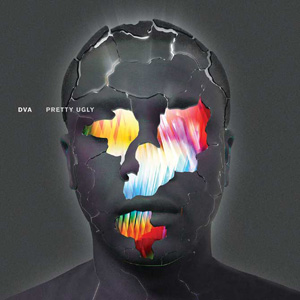DVA Pretty Ugly
DVA (a.k.a. Leon Smart) is a weird guy. Even with his gully London roots and […]

DVA (a.k.a. Leon Smart) is a weird guy. Even with his gully London roots and a musical coming-of-age that took place amongst the gritty backdrop of grime and UK funky, he’s never been a menacing character. That said, he’s never been what most people would call normal, either. Until recently, DVA spent six years as the morning-show host on Rinse FM. During most of his tenure, the station wasn’t even legally broadcasting, which begs a couple of questions. First, what sort of pirate station has a morning show? Second, and most importantly, what kind of person takes the job? As it turns out, the same kind of oddball who would put together a jumbled collection of tunes like Pretty Ugly.
On first listen, DVA’s debut full-length comes across as a bit of a mess. Pretty Ugly definitely isn’t a focused effort, yet it’s also not a lazy one. Most of its offerings are absolutely dense with sound; DVA clearly didn’t crank this record out in a hurry. If anything, the songs are overworked, as the countless flourishes and minute details occasionally detract from the productions’ key melodies and rhythms. As a producer, DVA has always been a bit manic, but on Pretty Ugly, that hyperactive tendency sometimes prevents his tunes from settling into a proper groove.
This news is especially troubling for listeners checking out Pretty Ugly in hopes of unearthing some peak-time gems. Granted, even DVA’s most club-friendly releases of the past, such as “New World Order,”“Ganja,” and “Jelly Roll”, were unique, left-of-center cuts that often employed bizarre melodic ideas, but the songs’ clacking drum patterns and UK funky rhythms still kept things focused on the dancefloor. On Pretty Ugly, only “Polyphonic Dreams” carries the same sort of heft. It’s too bad, as the brightly colored and weirdly seasick tune is undoubtedly one of the finest tunes DVA has ever created.
As for the remaining 11 tracks on Pretty Ugly, they largely eschew the club, instead presenting a mish-mash of electronic funk, soul, R&B, and the sort of experimentalism that drives the LA-centric beat scene. There are also lots of vocals, with no fewer than seven songs featuring a guest vocalist. “Just Vybe,” the crunchy, Fatima-voiced gem that DVA previously released as a single in 2010, still sounds great and “Why U Do,” featuring a clattering drum pattern and the sassy vocal contributions of Al, reaches similar heights. Without question, DVA is to be commended for bucking current trends and not filling his album with recycled samples of ’90s R&B starlets and house divas. That said, working with real vocalists is always a risk, and, as one might expect, some of the performances aren’t quite up to par or, as is more common on Pretty Ugly, simply don’t mesh with the music. For instance, “Madness” highlights the silky tones of Vikter Duplaix, but the track’s drunken drum beats and bloopy synth melody, while interesting, seem rather incongruous with his vocals. The same can be said for “Fire Fly,” where the song’s woozy rhythm wanders along but never gels with Zaki Ibrahim’s jazzily soulful turn at the mic. Natalie Maddix sounds deliciously smooth and sultry on “Eye Know,” but the gently buzzing 8-bit melodic tones aimlessly hover about and add little to her performance.
Unfortunately, this lack of direction also plagues the instrumental cuts on Pretty Ugly, although the tracks without guest vocalists are stronger on the whole. “Reach the Sun” opens the album with a distorted melodic swirl before breaking into a shuffling house rhythm and employing the kinds of chopped vocal bits that DVA is more than adept at manipulating. “Bare Fuzz” is something like an ADD-addled grime tune, while “The Big 5ive” is a refreshingly jazzy take on UK funky streaked with neon synths. Album closer “Where I Belong,” a track with only minimal percussion, is one of Pretty Ugly‘s strongest tunes, its triumphant horn crescendo and subtly somber tone bringing a fitting end to the proceedings. There’s a lesson to be learned here, as DVA is most successful when he edits out the excess and focuses his production on a handful of strong elements. As a producer, it’s self-control, not talent, that he’s lacking.

